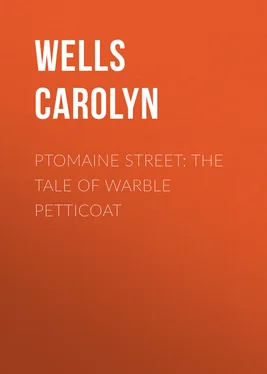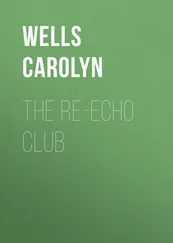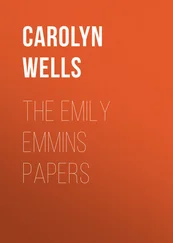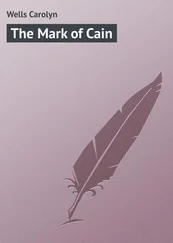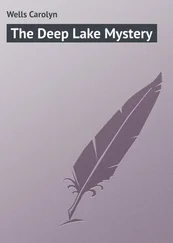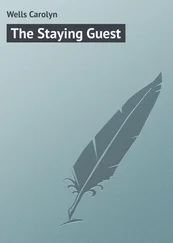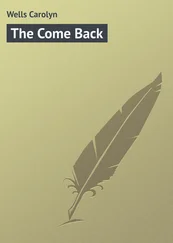Carolyn Wells - Ptomaine Street - The Tale of Warble Petticoat
Здесь есть возможность читать онлайн «Carolyn Wells - Ptomaine Street - The Tale of Warble Petticoat» — ознакомительный отрывок электронной книги совершенно бесплатно, а после прочтения отрывка купить полную версию. В некоторых случаях можно слушать аудио, скачать через торрент в формате fb2 и присутствует краткое содержание. Жанр: foreign_sf, foreign_antique, foreign_prose, на английском языке. Описание произведения, (предисловие) а так же отзывы посетителей доступны на портале библиотеки ЛибКат.
- Название:Ptomaine Street: The Tale of Warble Petticoat
- Автор:
- Жанр:
- Год:неизвестен
- ISBN:нет данных
- Рейтинг книги:5 / 5. Голосов: 1
-
Избранное:Добавить в избранное
- Отзывы:
-
Ваша оценка:
- 100
- 1
- 2
- 3
- 4
- 5
Ptomaine Street: The Tale of Warble Petticoat: краткое содержание, описание и аннотация
Предлагаем к чтению аннотацию, описание, краткое содержание или предисловие (зависит от того, что написал сам автор книги «Ptomaine Street: The Tale of Warble Petticoat»). Если вы не нашли необходимую информацию о книге — напишите в комментариях, мы постараемся отыскать её.
Ptomaine Street: The Tale of Warble Petticoat — читать онлайн ознакомительный отрывок
Ниже представлен текст книги, разбитый по страницам. Система сохранения места последней прочитанной страницы, позволяет с удобством читать онлайн бесплатно книгу «Ptomaine Street: The Tale of Warble Petticoat», без необходимости каждый раз заново искать на чём Вы остановились. Поставьте закладку, и сможете в любой момент перейти на страницу, на которой закончили чтение.
Интервал:
Закладка:
Carolyn Wells
Ptomaine Street THE TALE OF WARBLE PETTICOAT
FOREWORD TO A FOOLISH BOOK
A certain Poet once opined
That life is earnest, life is real;
But some are of a different mind,
And turn to hear the Cap-bells peal.
Oft in this Vale of Smiles I’ve found
Foolishness makes the world go round.
Ecclesiastes, Solomon,
And lots of those who’ve passed before us,
Denounced all foolishness and fun,
Not so the gay and blithesome Horace;
And Shakespeare’s Jaques, somewhat hotly,
Declared the only wear is Motley!
We mortals, fools are said to be;
And doesn’t this seem rather nice?
I learn, on good authority,
That Fools inhabit Paradise!
Honored by kings they’ve always been;
And—you know where Fools may rush in.
And so, with confidence unshaken,
In Cap and Bells, I strike the trail.
I know just how, because I’ve taken
A Correspondence Course by mail.
I find the Foolish life’s less trouble
Than Higher, Strenuous or Double.
Dear Reader, small the boon I ask,—
Your gentle smile, to egg my wit on;
Lest people deem my earnest task
Not worth the paper it is writ on.
Well, at white paper’s present worth,
That would be rather high-priced mirth!
I hope you think my lines are bright,
I hope you trow my jests are clever;
If you approve of what I write
Then you and I are friends forever.
But if you say my stuff is rotten,
You are forgiven and forgotten.
Though, as the old hymn runs, I may not
Sing like the angels, speak like Paul;
Though on a golden lyre I play not,
As David played before King Saul;
Yet I consider this production
A gem of verbalesque construction.
So, what your calling, or your bent,
If clergy or if laity,
Fall into line. I’ll be content
And plume me on my gayety,
If of the human file and rank
I can make nine-tenths smile,—and thank.
CHAPTER I
On a Pittsburgh block, where three generations ago might have been heard Indian war-whoops—yes, and the next generation wore hoops, too—a girl child stood, in evident relief, far below the murky gray of the Pittsburgh sky.
She couldn’t see an Indian, not even a cigar store one, and she wouldn’t have noticed him anyway, for she was shaking with laughter.
A breeze, which had hurried across from New York for the purpose, blew her hat off, but she recked not, and only tautened her hair ribbon with an involuntary jerk just in time to prevent that going too.
A girl on a Pittsburgh block; bibulous, plastic, young; drinking the air in great gulps, as she would later drink life.
It is Warble Mildew, expelled from Public School, and carolling with laughter.
She had only attended for four weeks and they had been altogether wasted. In her class there were several better girls, many brighter, one prettier, but none fatter. The schoolgirls marveled at the fatness of her legs when, skirts well tucked up, they all waded in the brook. Every cell of her body was plump and she had dimples in her wrists.
And cheeks, like:
A satin pincushion pink,
Before rude pins have touched it.
Her eyes were of the lagoon blue found in picture postcards of Venice and her hair was a curly yellow brush-heap. Sunning over with curls—you know, sort of ringolets.
In fact, Warble was not unlike one of those Kewpie things, only she was more dressed.
Expelled!
That’s the way things were to come to Warble all her life. Fate laid on in broad strokes—in great splashes—in slathers.
Expelled! And she had scarce dared hope for such a thing.
To sound the humor of Warble.
She hated school. Books, restraint, routine, scratching slate pencils, gum under desks, smells—all the set up palette of the schoolroom was not to her a happy vehicle of self-expression.
Often, in hope of being sent home, she had let a rosy tongue-tip protrude from screwed up red lips at teacher, but it had gone unpunished.
And now—
Now, rocking in triumphant, glorious mirth, her plump shoulders hunched in very ecstasy, the child was on the peak!
Expelled! Oh, gee!
And all because she had put a caterpillar down Pearl Jane Tuttle’s back. One little, measly caterpillar.
Pearl Jane had sat right in front of her.
A loose neckband round a scrawny neck.
And when Pearl Jane wiggled, a space of neck between two thin, tight black pigtails—a consequent safe-deposit that was fairly crying out to have something dropped down it.
A caterpillar mooching along the schoolroom aisle—clearly sent by Providence.
Helpless in the grip of an irresistible subconscious complex, Warble scoops up the caterpillar and in an instant has fed him into the gaping maw at the back of that loose gingham neckband.
Gr-r-r-r-rh!
That, then, is why Warble stood in such evident relief on the Pittsburgh block.
Expelled! The world was hers!
It had always been hers, to be sure, but it was now getting bigger and more hers every minute.
The very first day she went to school, a little boy said to her:
“Do you like me?”
“No,” said Warble.
The little boy gave her all his candy and his red balloon.
So you see, she had a way—and got away with it.
Warble was an orphan. She had a paprika-seasoned sister, married to a chiropodist, in Oshkosh. But for all that, she planned to earn her own living.
And she had an ambition. At present beyond her grasp, yet so sure was she of its ultimate attainment, that she shaped her entire cosmic consciousness toward that end. Her ambition was not unique, perhaps not unattainable. It had been achieved by others with seemingly little effort and less skill; and though as yet, merely a radiant hope, Warble was determined that some day she would gain her goal.
Her ambition was to get married. Her sister had; her mother had; she politely assumed her grandmother had.
She would.
Often she imagined herself the heroine of delightful scenes she watched at the cinema. She loved the slow unwinding of the story on the screen, but when engaged with her imagination she hurried it on in haste to reach the final close-up.
It was at no one’s advice, but because of her own inner yearnings that Warble took a job as waitress in a Bairns’ Restaurant.
She reveled in the white tiles, the white gloss paint, the eternal clearing-up and the clatter of flatware. She loved the flatware—it always made her think of a wedding—sometimes of her own.
She adored the white-capped King Alfred baking his cakes in the window, but merely as a fixture, as she adored the mute stacks of clean plates and the piles of pathetic little serviettes.
In a more intimate and personal way she adored the pork and beans, the ham and eggs, the corned beef and cabbage, and—importantly—the gentle, easy-going puddings and cup custards. These things delighted her soul and dimpled her body.
She was proud of her fellow-waitresses, proud of their aspirations (the same as her own).
Having exceptional opportunity, Warble learned much of culinary art and architecture, at least she became grounded in elementary alimentary science.
She had little notebooks filled with rules for Parisian pastry, Hindu recipes for curry; foreign dishes with modern American improvements.
Joyously she learned to make custard pie. This, as the tumultous future proved, was indicative.
Only the little smiling gods of circumstance, wickedly winking at one another, knew that when Warble whipped cream and beat eggs, she laid the corner stone of a waiting Destiny, known as yet but to the blinking stars above the murky Pittsburgh sky.
Читать дальшеИнтервал:
Закладка:
Похожие книги на «Ptomaine Street: The Tale of Warble Petticoat»
Представляем Вашему вниманию похожие книги на «Ptomaine Street: The Tale of Warble Petticoat» списком для выбора. Мы отобрали схожую по названию и смыслу литературу в надежде предоставить читателям больше вариантов отыскать новые, интересные, ещё непрочитанные произведения.
Обсуждение, отзывы о книге «Ptomaine Street: The Tale of Warble Petticoat» и просто собственные мнения читателей. Оставьте ваши комментарии, напишите, что Вы думаете о произведении, его смысле или главных героях. Укажите что конкретно понравилось, а что нет, и почему Вы так считаете.
